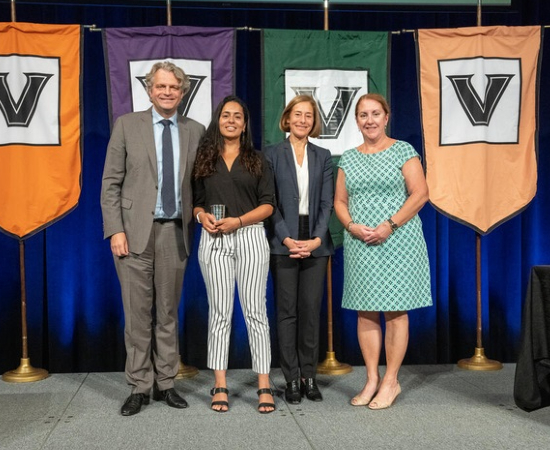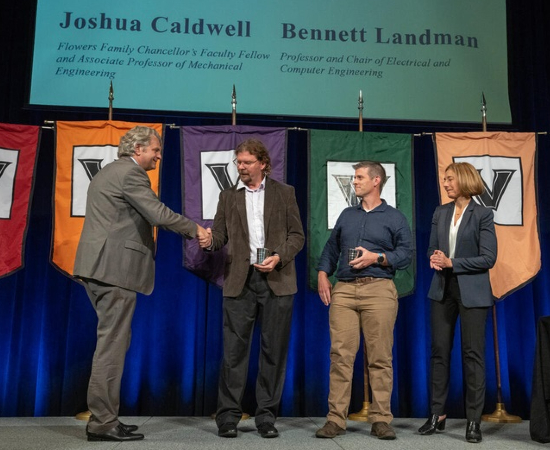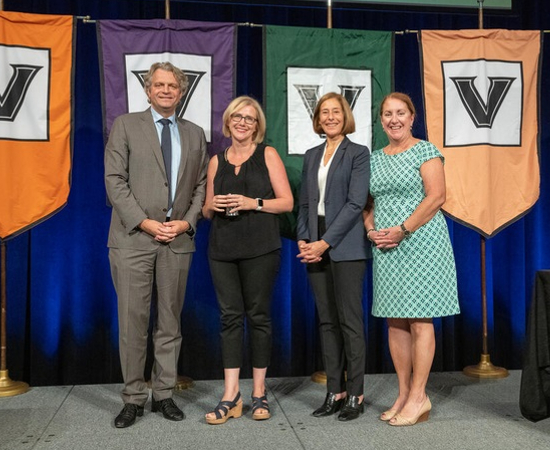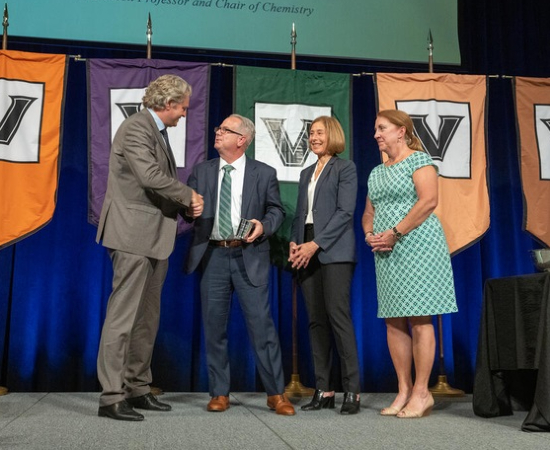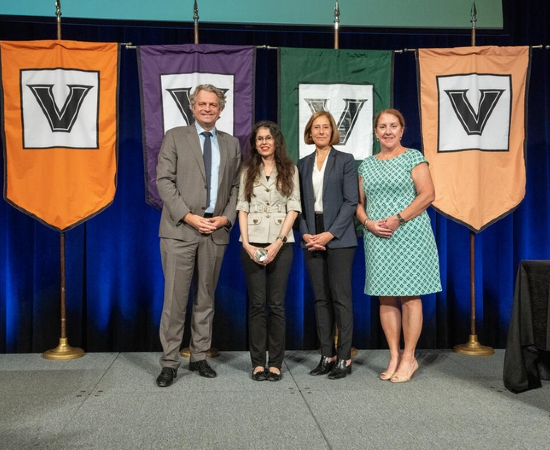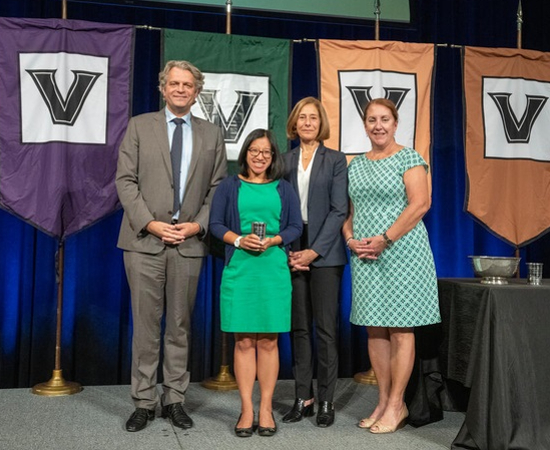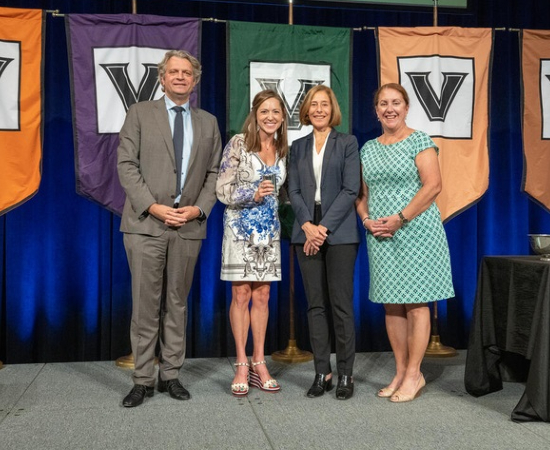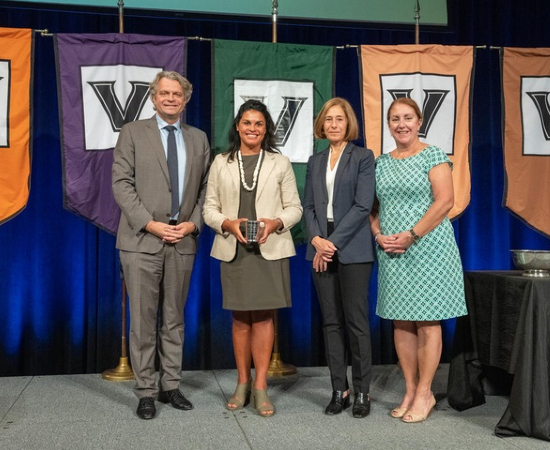Chancellor Daniel Diermeier has placed a strong priority on expanding Vanderbilt’s global presence as the university prepares to celebrate its sesquicentennial next year. Diermeier said during his remarks at Fall Faculty Assembly that building Vanderbilt’s international reputation is “top of mind every day” for the university’s leadership.
“The pursuit of discovery, and the courage to take risks, are in the fabric of who we are as an institution. And today we are emboldened to take our collective ambition much further,” Diermeier said. “As we take stock on the eve of our sesquicentennial, the obvious question is: Where do we go from here? And the answer is that it is time to expand our reach around the world. We must make Vanderbilt a university with an undeniable global presence, known and admired through work, relationships and impact beyond North America.”
This year’s Fall Faculty Assembly, which included presentation of some of the university’s most prestigious awards, was held in person at the Student Life Center on Sept. 1. Diermeier noted that Vanderbilt will commemorate its 150th year next year, and the university has far exceeded the expectations of its founders. The state of the university is stronger than it has ever been, he reported. The endowment is valued at more than $10.5 billion, the highest in the university’s history, and last year, for the first time, the university exceeded $1 billion in research funding.
Diermeier outlined a bold path for Vanderbilt to expand its reach around the world. He emphasized that, while Vanderbilt’s reputation as one of the best educational institutions continues to soar in the United States, the university lags behind where it should be in global recognition. “We know that we must foster more collaboration with international researchers, partner with more of the best international faculty and students, publicize more of your innovations and discoveries worldwide, and expand and strengthen our global alumni network,” he said.
The chancellor noted that, as Vanderbilt looks to its global ambition, the university must continue to invest in discovery and research. He thanked the Faculty Senate Task Force on Administerial Effectiveness for its partnership with the university leadership on efforts to strengthen research and grant support infrastructure.
“I also want to thank Provost Raver for her leadership of our research enterprise and her tireless advocacy for expanding the resources you need to discover and innovate,” he said.
The university also must expand its investments in graduate and undergraduate education. Diermeier pointed to momentum in the university’s approach to the undergraduate experience, including new strategies emerging from the Career Center and the continued push on the residential college model. New efforts with graduate education include a $5 million annual investment from the Office of the Provost and the launching of Student Success Stipends for newly enrolled doctoral students to jumpstart their academic careers.
Diermeier stressed that the university must renew its commitment to the free expression and open inquiry that are fundamental to “delivering transformative education and pathbreaking research.”
In outlining the need for a global strategy, he praised the findings of the university’s International Strategy Working Group, which will guide the work to lift the university’s international presence. “The time to accelerate those efforts is now. We see not just the opportunity, but the very real strategic need for Vanderbilt to become a truly global enterprise,” he said.
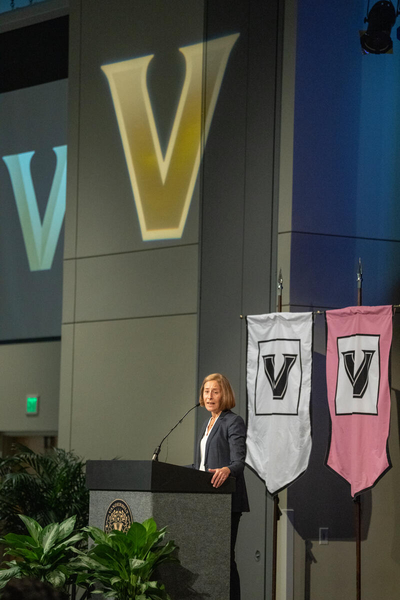
C. Cybele Raver, provost and vice chancellor for academic affairs, emphasized the university’s dedication to supporting the creation of new knowledge during her remarks. “As your provost and chief academic officer, I want to sharpen our focus and attention to the spirit of discovery and innovation that lies at the core of our shared commitment to ‘dare to grow,’” Raver said.
She outlined a series of investments in faculty that is spurring the discovery and creation of new knowledge. Some of these include:
- awarding of more than $1 million to faculty through the Seeding Success, Scaling Success and Rapid Advance internal funding programs;
- recruitment of a landmark number of stellar new faculty members—hiring some 150 tenure-track faculty since 2020—thanks in large part to Destination Vanderbilt; and
- launches of pathbreaking interdisciplinary institutes, including the James Lawson Institute for the Research and Study of Nonviolent Movements and the McGee Applied Research Center for Narrative Studies in the College of Arts and Sciences.
Raver noted her support and partnership with Diermeier in expanding Vanderbilt’s international presence. “In pursuit of the global vision Chancellor Diermeier described, we’re working with the deans to bring more of the world here, to Nashville,” Raver said. “That means reaching broader pools of international talent in our efforts to recruit faculty and students. It also means bringing visiting faculty here—and we have a fantastic slate of visitors scheduled for this academic year.
“I hope you’ll agree that there has never been a better moment to be at Vanderbilt,” she said. “There is so much to be proud of here—and so much ahead of us.”
FACULTY AWARDS
Diermeier, Raver and Faculty Senate Chair Rebecca R. Swan, professor of pediatrics and assistant dean for graduate medical education, presented awards to 11 faculty members who have made a significant impact through scholarship, research or creative expression.
The Chancellor’s Award for Research recognizes excellence in works of research, scholarship or creative expression published or presented in the last three calendar years.
Mariana Byndloss, assistant professor of pathology, microbiology and immunology, was honored for her co-authored piece “High-fat diet-induced colonocyte dysfunction escalates microbiota-derived trimethylamine N-oxide.” The article, published in the journal Science in 2021, investigates the role of a high-fat diet in cardiovascular disease. “Findings by the Byndloss laboratory point to the metabolic interactions between intestinal epithelium and the gut microbiota as a previously unexplored player in the pathogenesis of obesity-associated cardiovascular disease,” Diermeier said.
Joshua Caldwell, Flowers Family Chancellor Faculty Fellow and professor of mechanical engineering, and Bennett Landman, professor and chair of electrical and computer engineering, were honored for their co-authored piece “Deterministic inverse design of Tamm plasmon thermal emitters with multi-resonant control,” which was published in the journal Nature Materials in 2021. The Caldwell lab has been developing infrared sources to exhibit narrow bandwidth—polarized and potentially directional emission that would match an arbitrary target spectrum. “The work highlighted in this article offers multiple revolutionary advances beyond the current state of the art, and it has had a large impact,” Diermeier said.
Emily Greble, associate professor of German, Russian and European studies and associate professor of history, was honored for her book Muslims and the Making of Modern Europe. Published in 2021 by Oxford University Press, this work explores how Muslims were citizens of modern Europe from its beginning and, in the process, rethinks not only European history, but Europe itself. “Emily’s book is a milestone publication that has been called ‘a book of the decade,’” Diermeier said. “She is writing history from the ground, and her superb skills show in the telling of individual stories that reflect and refract larger histories.”
John McLean, Stevenson Professor of Chemistry and chair of the department, was honored for his co-authored piece “Collision cross section compendium to annotate and predict multi-omic compound identities,” published in the journal Chemical Science in 2019. The McLean group is regarded as pioneers in the development and application of ion mobility-mass spectrometry—IM-MS—for omics analysis. The work in this paper presents a large, unified collision cross section—or CCS—compendium of experimentally acquired CCS values. The predictive abilities of the Unified CCS Compendium will improve in specificity and expand across more chemical classes as data from the IM-MS community is contributed, vetted and integrated. “John’s work highlighted in this paper provides an invaluable tool for collaborative scientific research,” Diermeier said.
Yesha Yadav, Milton R. Underwood Professor and professor of law, was honored for her article “The Failed Regulation of U.S. Treasury Markets,” published by Columbia Law Review in 2021. In her pathbreaking and award-winning article, Yadav addresses the question of what does it mean for the world economy if the financial market thought to be the world’s safest—U.S. Treasuries—is actually at great peril? “Yesha’s work provides a comprehensive and detailed analysis of the U.S. Treasury market and its weaknesses while also providing proposals for reforming that market—careful proposals that have a real chance of adoption,” Diermeier said.
Three faculty members received the Chancellor’s Award for Research on Equity, Diversity and Inclusion, which recognizes excellence in research, scholarship or creative expression that specifically advances understanding of equity, diversity and inclusion.
Joanne Golann, assistant professor of public policy and education, was honored for her book Scripting the Moves: Culture and Control in a ‘No-Excuses’ Charter School, published in 2021. Golann’s research offers a window into an expanding model of urban education reform that uses “scripts” that rule behavior—from how to dress and how to applaud to how to complete homework. Through 18 months of ethnographic fieldwork; 132 interviews with students, teachers, administrators and parents; and analysis of documents and data, Golan argues that “no-excuses” charter schools dictate too rigid a level of social control for both teachers and the predominantly low-income Black and Latino and Latina students they serve. “Joanne concludes that, despite good intentions, scripts constrain the development of important interactional skills and reproduce some of the very inequities they mean to disrupt,” Diermeier said.
Jennifer Shinall, professor of law, was honored for her article “Protecting Pregnancy,” published by Cornell Law Review in 2020. Her work is a sophisticated analysis of an important and complex question: Which laws designed to assist pregnant women in the workplace actually succeed at doing so? “Jennifer has uncovered important data about pregnancy and used it to design an ingenious study based on the differential timing of certain kinds of laws in different states,” Diermeier said. “With the recent overruling of Roe v. Wade, new legislative efforts regarding reproductive health and labor market outcomes for pregnant women are expected, which makes Jennifer’s work all the more relevant and important.”
Rebecca VanDiver, assistant professor of history of art and architecture, was honored for her book, Designing a New Tradition: Lois Mailou Jones and the Aesthetics of Blackness, published by Penn State Press in 2020. VanDiver offers a new perspective on the art and career of Lois Mailou Jones, a well-known artist who has not received adequate scholarly attention. VanDiver considers the importance of Africa for Jones’ work and examines the broader roles played by class, gender and politics in construction of African American art histories as a whole. “Tracing Jones’ aesthetic transformations along a biographical arc, Rebecca offers a new framework for thinking about the connection between America and Africa and the role of the African diaspora in the creation of African American artistic identity,” Diermeier said.
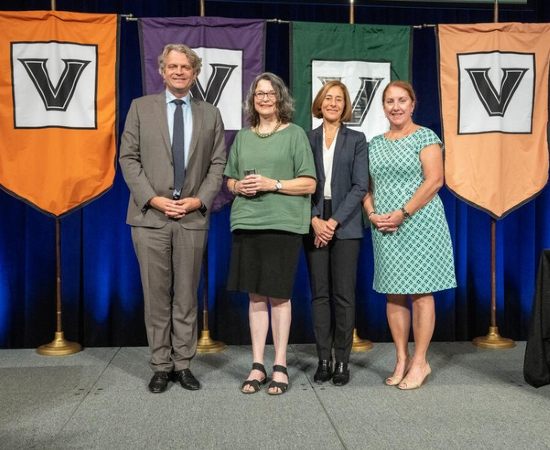
The Thomas Jefferson Award honors a faculty member for distinguished service to Vanderbilt through extraordinary contributions as a member of the faculty in the councils and government of the university. This year’s honoree is Senta Victoria Greene, Stevenson Professor of Physics. Greene’s accomplishments include: leading the Task Force on Administerial Effectiveness and compiling information to produce an actionable report; advocating for fellow faculty with insight, determination and a commitment to faculty well-being while serving as chair of the Faculty Senate; and supporting and helping advance women in STEM disciplines throughout her career. “Vicki’s substantive and longstanding service to Vanderbilt since she joined the faculty in 1994 has spanned her department, her college, the provost’s office and the university as a whole,” Diermeier said. “As Dean John Geer noted in the award nomination, ‘She has done so much so willingly … and she always brings her best to a task.’”
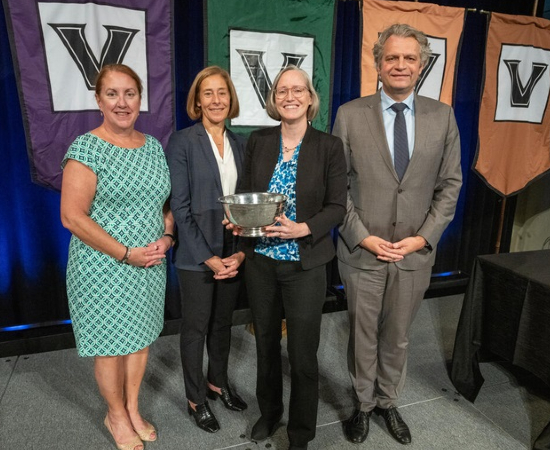
The Earl Sutherland Prize for Achievement in Research, Vanderbilt’s most prestigious faculty honor for achievement in research, was presented to Elizabeth Zechmeister, Cornelius Vanderbilt Professor of Political Science. Her focus is comparative political behavior and public opinion, particularly in Latin America. Her work includes studies of voting, ideology, political parties, representation, charisma and crisis. Zechmeister has received support from the National Science Foundation for investigations into the public opinion consequences of terrorist threat and natural disaster. She has published articles in leading journals, such as the American Journal of Political Science and the Journal of Politics, and she is the co-author of several books, including Democracy at Risk: How Terrorist Threats Affect the Public. Data gathered through the Latin American Public Opinion Project, for which Zechmeister is director, and its AmericasBarometer survey provide the foundation for answers to many of her research questions. “Liz’s research provides data-driven insight into some of the most pressing issues of our time,” Diermeier said. “She has achieved international recognition and impact while also leading in research-focused teaching and training at Vanderbilt.”
In addition, Diermeier recognized members of the faculty with 25 consecutive years of full-time service. They will receive a chair with the Vanderbilt logo and a brass plate engraved with their name next spring.
